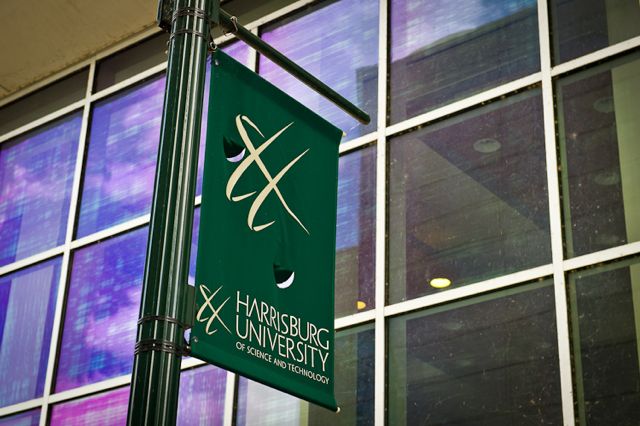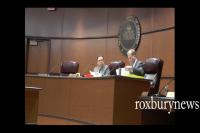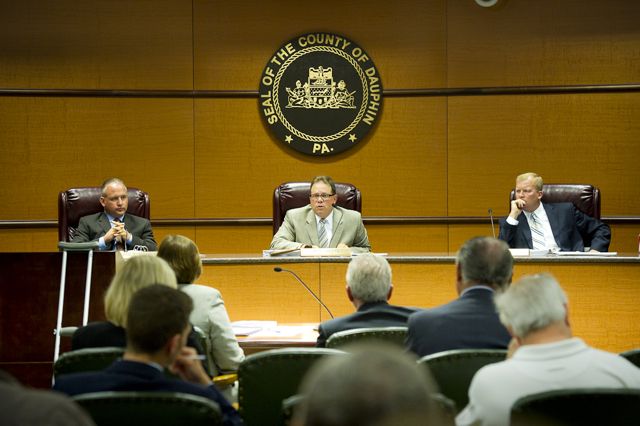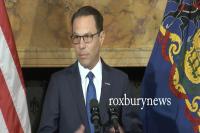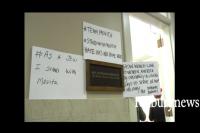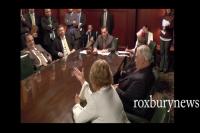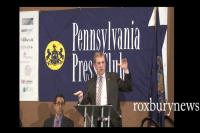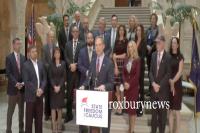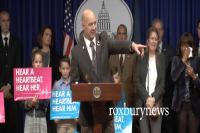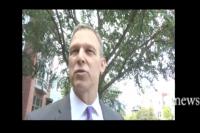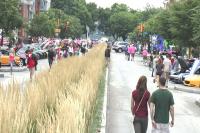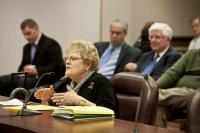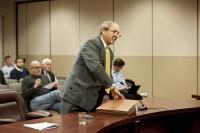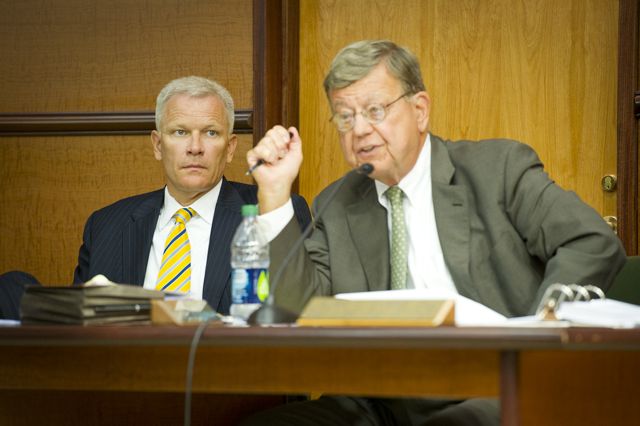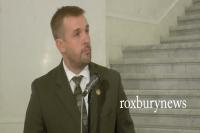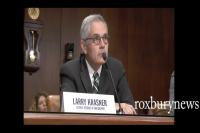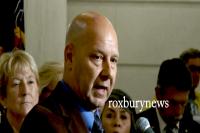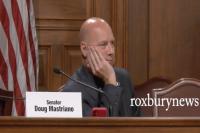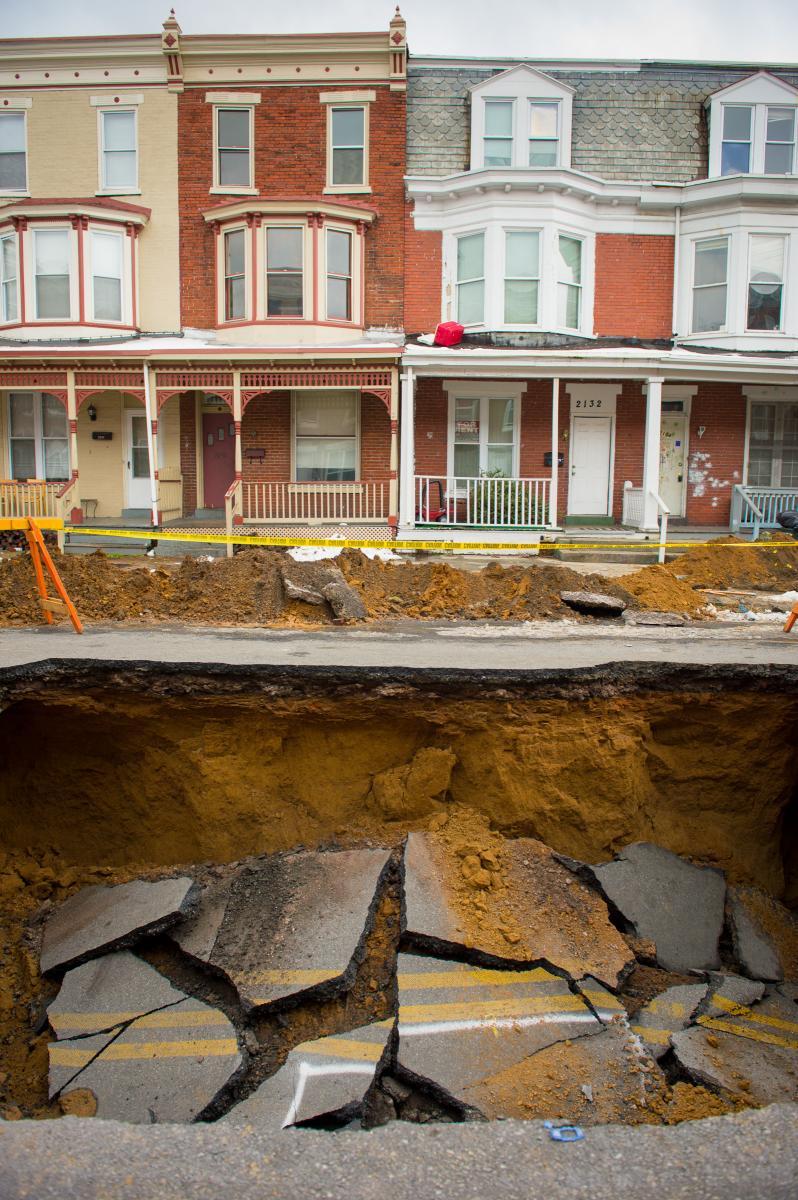BILL ANALYSIS Provided by the House Democratic Caucus
Two amendments were adopted by the House Transportation Committee on June 27, 2013. One amendment was a gut and replace while the other made some additional changes to the gut and replace amendment.
Public Transit Related Amendments to Title 74 and Title 75:
Title 74 Amendments:
Section 1503 (relating to definitions)
Amends the definition of "base operating allocation" to be determined by the last full fiscal year that the qualifying transit agencies receive assistance including the funds received from the Alternative Energy Capital Investment Program. It also changes the definition of "capital expenditure" to give PennDOT the ability to allow preventative maintenance expenses to be eligible as a capital expenditure.
Amends Section 1504 (relating to department authorization)
Allows PennDOT to operate transit service in the Commonwealth by contract or with its own personnel. Those activities and services provided by PennDOT are not subject to the jurisdiction of the Public Utility Commission (PUC).
Establishes a new Section 1505.1 (relating to fees and taxes)
Moves the provision currently in Article II of the Tax Reform Code and increases the tire fee from $1 to $2 per tire. Also increases from 3% to 6% the total lease price on the lease of a motor vehicle (doesn't include trucks class 4 and higher). The rental tax of $2 for each day or part of the day is also imposed on a vehicle rental.
Section 1506 (relating to Public Transportation Trust Fund (PTTF))
Sunsets the $250M payments made by the Pennsylvania Turnpike Commission (PTC) under Act 44 to the PTTF after FY 2020-2021. The bill repeals the Public Transportation Assistance Fund. The funds from the increased tire fee, increased lease tax and car rental tax go into the fund. Also, the replacement revenues deposited under Act 44 ($250)will go into the PTTF in FY 2021-2022 and each year thereafter. These replacement funds will come from the receipts from the tax collected under section 298 of the Tax Reform Code on motor vehicles, trailers and semi-trailers if no other legislation is enacted before that time. Revenues from the increased fines for violations of section 3111 (relating to obedience to traffic control devices) will got to the PTTF.
Decreases the payments from the PTC payments to the operating program for transit agencies beginning in FY13-14. The $250M the PTTF currently receives goes to the operating program.
$121M - FY 13-14 and FY 14-15 $30M- FY 15-16 and FY 16-17 $0.00 - FY 17-18 and thereafter Also, the revenues deposited into the PTTF from the sales and use tax will go towards the operating program. Currently, the PTTF receives 4.4% of the sales and use tax and 69.99% of those revenues deposited go to the operating program. The new language increases that percentage to 86.76%. In addition, the operating program will receive revenues from fees collected that are not constitutionally protected from being used solely for roads and bridges after 23% is allocated to the Multimodal Fund. In fiscal years 13-14 through 16-17, the PTTF will receive all remaining revenue and two-thirds of the revenue in each fiscal year thereafter. Directs 95% of the remaining revenue deposited into the PTTF under Act 44 to be allocated to the Asset Improvement program as well as the revenues for the replacement funds for the Act 44 payments and revenues from the increase fines for violations section 3111 (relating to obedience to traffic control devices). After June 30, 2017, one-third of the revenues from the unprotected fees will go to the Asset Improvement program.
Directs any remaining revenue from the payments made by the PTC to the PTTF to the Program of Statewide Significance.
Authorizes that no more than $60M be allocated to fund the Alternative Energy Capital Investment program which is newly established under this bill.
Section 1507 (relating to application and approval process)
Requires transit agencies to provide a statement of policy outlining the basic principles for the adjustment of fare growth to meet the rate of inflation in order to receive financial assistance. Transit agencies are already required to submit evidence of commitment for matching funds satisfactory to PennDOT by June 30 of the fiscal year. It also limits the duration of a waiver for the use of funds so that it does not exceed the duration of the plan of corrective action. If a plan of corrective action is not implemented, PennDOT may rescind the waiver.
Section 1512 (relating to coordination and consolidation)
Requires PennDOT to study the consolidation and mutual cooperation of transit agencies as a means of reducing expenses without loss of service. The study must look at the creation of service regions to determine if consolidating would reduce annual expenses. If it concludes that consolidating will result in an annual saving of at least $2M or 25% of the local match to at the time of completion, the transit agency or municipality may implement the recommended action. PennDOT must waive the match increase for five fiscal years for a transit agency or municipality who is willing to consolidate.
Section 1513 (relating to operating program)
Increases the local match for operating assistance for transit agencies from 15% to 20%. Beginning in FY 14-15, if the local match provided is less than the 20% t he local matching funds will be increased annually by a minimum of 5% (unless a lesser amount is needed) above the amount provided until 20% is met.
Section 1514 (relating to asset improvement program)
Increases the local match for capital assistance for transit agencies from 3.33% to 10%. The local match will increase annually by a minimum of 5% of the match require for the previous year.
Creates a new subsection for the allocation of financial assistance for the Asset Improvement program.
SEPTA - 69.4% Port Authority of Allegheny County - 22.6% All others - 8% Before distributing, PennDOT will receive 5% for discretionary use Section 1516 (relating to programs of statewide significance) Amends this section to allow Allegheny County to participate in the Person with Disabilities program. The section is also amended to allow a transit agency to apply for funds from the operating grogram to assist with a short term demonstration project to transition into a regular public passenger transportation service.
Creates a Shared Ride Community Service Delivery Pilot Program which PennDOT will develop and implement to test new ways of paying for and delivering shared ride and community transportation. The bill establishes a pilot advisory committee to provide guidance. The committee includes, a member appointed the Majority and Minority Chairs of the Senate and House Transportation Committees, two members from the PA Public Transit Association, a member appointed by Secretary of PennDOT to represent people with disabilities, a member appointed by Secretary of Aging to represent senior citizens, a member appointed by Secretary of Public Welfare to represent people using medical assistance transportation, a member of the County Commissioners Association, the Secretary of PennDOT or designee, the Secretary of Aging or designee, and the Secretary of the Office of the Budget or designee. PennDOT must work with the committee to define potential pilot models within 6 months.
Section 1517 (relating to capital improvement program)
States that financial assistance for the existing capital improvement program will cease when the Secretary certifies that funds are no longer available for this program.
Section 1517.1 (relating to alternative energy capital investment program)
Creates a new section authorizing PennDOT to establish a competitive grant program to implement capital improvements to support conversion of a transit agency's fleet to an alternative energy source. The criteria for grants must include feasibility, cost/benefit analysis and project readiness. PennDOT may also use the funds to supplement a local transit agency base operation allocation if necessary to stabilize an operating budget.
Section 1521.1 (relating to local tax for mass transportation)
Includes language to allow municipalities, at their discretion, to impose local taxes for mass transit to defray cost of operation, maintenance and debt service. The following taxes may be imposed:
Up to .5 percent increase in Realty Transfer Tax Up to .2 percent increase in Earned Income Tax Up to .25 percent increase in Sales and Use Tax In addition, this section allows municipalities to administer grants to meet the necessary local match requirements. Multimodal Transportation Fund - Title 74 Amendment
Creates a new chapter to establish a special fund in the State Treasury, known as the Multimodal Transportation Fund (Fund). The Fund will be comprised of $10 Million from revenue deposited in the PTTF from the PTC; 23% of the revenues from the fees that are not constitutionally protected, beginning with FY 15-16 revenues allocated from the oil company franchise tax to be expended in accordance with the constitution and any other appropriations or deposits and interest earned. The money in the Fund must be used for aviation, rail freight, passenger rail, port and waterways, bicycle and pedestrian bridges, roads and bridges, and other modes. The annual distributions of the money is as follows:
$3M - aviation $6M- rail freight $6M - passenger rail $8M - ports and waterways $2M - bicycle and pedestrian facilities The remaining is for eligible programs upon agreement of a majority of the Chairmen of the Transportation Committees in the Senate and House of Representatives. The local match for projects funded under this chapter will require a local match equal to 30% of the non-federal share of the project cost. First class city consolidated car rental facility - Title 74 Amendment
Authorizes a city of the first class (Philadelphia) to impose a customer facility charge of not more than $8 per rental day on a customer renting a vehicle from a vehicle rental company doing business at the airport. A city may adjust the customer facility charge necessary to fund the consolidated car rental facility. The revenue is to be used for construction, operation of a rental facility, improvements to a rental facility, cost of a transportation system, and rental facility operation and maintenance.
Traffic Signals Replacement and Synchronization Program - Title 74 Amendment
Creates a new chapter that authorizes agility agreements between municipalities and PennDOT to replace, synchronize and time traffic signals in a designated traffic corridor. The term of the agreement may not exceed the useful life of traffic signals. The municipalities must properly maintain and time the traffic signals in accordance with agreements. If a municipality fails to correct deficiencies identified, PennDOT may take action to correct it. PennDOT may deduct actual costs of correcting the deficiencies from payments made to municipalities.
Bridge Bundling Program - Title 74 Amendment
Creates a new chapter that authorizes PennDOT to bundle the design and construction of highway bridges owned by the Commonwealth or local governments. PennDOT must annually develop a preliminary list from different regions on a rotating basis of eligible bridges and must notify the local government owning bridges recommended for inclusion. PennDOT makes the final determination of bridges to be designed and constructed under the program and provide a list to the planning organizations. Upon execution of the agreement, PennDOT must manage project design and construction. Bridges recommended for inclusion in program are not required to be itemized in the capital budget. A local government that participates will receive a reduction of the local share of the costs associated with the design and construction of up to 100% of the cost. A local government who refuses participation is required to pay 30% of the non-federal share of costs.
Bridge Maintenance - Title 74 Amendment
Adds a new chapter stating that municipalities that fail to maintain a bridge on a state highway or under the jurisdiction the municipality would be penalized. The municipality would have 60 days to correct the deficiencies contained in PennDOT's written notice or 30 days to contest the violation. If a municipality fails to correct the deficiencies, PennDOT may deduct the cost of correcting the deficiencies from the municipality's liquid fuels money.
Public Utility -Title 74 Amendment
Allows PennDOT to change, adjust, alter or relocate water and sewer lines owned and operated by a public utility, if, during construction, widening or relocation of a state highway is being done. PennDOT may enter into an agreement with the utility to share the costs associated with the work done.
Pennsylvania Turnpike related Amendments to Title 74 and Title 75
Section 8102 of Title 74
Adds definitions for "automated toll collection", "certification of passage", "certification of passage toll collection" , "toll collection", "video tolling", "violation" and changes existing definitions to assist with the collecting of unpaid tolls to address technological changes and to facilitate the conversion to all-electronic tolling.
Section 8105 of Title 74
Institutes a two term limit for members of the PTC . Also, an appointed member who has not been reconfirmed/reappointed may continue to hold office for 90 days or until a successor is appointed, whichever is shorter. There currently is no time limit.
Section 8117 Title 74
Substantially rewrites the section and codifies the current practices of the PTC as it relates to certificate of passage. The section also allows PennDOT to suspend the registration of a vehicle upon notification from PTC that the owner or registrant of the vehicle has either failed to pay or defaulted in the payment of six or more violations, or incurs unpaid tolls or administrative fees and/or costs that collectively total a minimum of $500.00.
Section 8121 of Title 74
Requires at least one Commissioner to testify before the Appropriations Committee of the Senate and the House of Representatives in June of every year.
Section 8204 of Title74
Requires the Auditor General to review the PTC's performance and operating budget every two years instead of every 4 years.
Section 1380 of Title 75
Allows PennDOT to suspend a vehicle registration upon notification from a tolling entity that the owner or registrant of the vehicle has failed to pay unpaid tolls to the tolling entity. PennDOT may suspend a registration for a violation occurring outside the Commonwealth upon notification from a tolling entity with a reciprocal agreement with the Commonwealth.
Section 6110 of Title 75
Imposes penalties for persons who take affirmative action to evade a toll. The penalty is a summary offense and carries a fine of $6500 and imprisonment of 60 days.
Section 8901 of Title 75
Sunsets the payments made by the PTC to PennDOT in FY 2020-2021.
Amendments to Driver's Licenses, Registrations and Increased Fees - Title 75
Section 1904 - "Unprotected Fees" and Four-Year Inflationary Fee Increase
Fees from the following sections; 1951 (c) (relating to Identification card renewal), 1952 (relating to certificate of title), 1953 (relating to recording/changing amount of security interest on a title), 1955 (relating to driver information),1956 (relating to certified copies of records) and 1958 (relating to inspection stickers) shall be transmitted to Treasury Department for deposit as follows:
FY 2013-2014 and FY 2014-2015 - 10% to Public Transportation Fund, 23% to Multimodal Fund, 67% to MLF. FY 15-16 and FY 16-17 - 43.6% to Public Transportation Fund; 23% to Multimodal Fund; and 33.4% to MLF. FY 17-18 and each other - 77% to Public Transportation Fund; 23% to Multimodal Fund. For a 48 month period between July 1, 2017 - June 30, 21 and thereafter, all fees in Title 75 shall be increased as calculated by applying percentage in CPI-U calculated March 1 - Feb 28. Highways and Bridge Funding related Amendments to Title 75
Section 8901 (relating definitions)
Immediately ends the $200M PTC payments under Act 44 that currently got to the MLF. The additional $250M to the PTTF sunsets in 2020-2021.
Section 9002 (relating to definition of average wholesale price)
Amends the definition of average wholesale price which is used to determine the Oil Company Franchise Tax. The average wholesale price increases as follows:
FY 13-14 and Jan. 2014-Dec. 2014 - $1.87 Calendar year 2015 and 2016 - $2.49 January 1, 2017 -floor is set at $2.49 and no cap The existing floor is 90 cents and the cap is $1.25 Section 9106 (relating to the dirt and gravel road program )
Provides for an increase in the amount DCNR and the State Conservation Commission receives for the program through the Oil Company Franchise Tax revenue. Currently, DCNR receives $1M for maintenance and mitigation of dust and sediment pollution from forestry roads, and State Conservation Commission gets $4M for maintenance and improvement of dirt and gravel roads. Under the bill, DCNR gets $7M and the State Conservation Commission receives $28M. $8M annually must got to low volume road maintenance and improvement.
Section 9301 (relating to supplement funding for municipal highway maintenance)
Allocates $5M from the MLF to counties based on square footage of deck areas of a county's county-owned bridges to the total square footage of deck area county-owned bridges statewide.
Section 9502 (relating to imposition of tax)
Of the 60 mills for FY 15-16 and thereafter, a minimum of $20M and maximum of $35M (at discretion of Secretary) must be deposited in the Multimodal fund to be expended according to PA constitution.
Of the additional 55mills imposed under Act 26 of 1991, the county maintenance district for highway maintenance will receive 29% (currently 42%) for FY13-14 and 19% for FY14-15 and thereafter. 30% (increased from 17%) will go for highway capital projects for FY13-14 and 40% for FY 14-15 and thereafter. 15% of the funding for capital projects are distributed at eth discretion of PennDOT until 20-23-2024
Of the additional 38.5mills imposed under Act 3 of 1997, 12% will go to municipalities as in the existing formula and the remaining 88% which is currently used for maintenance is reallocated as follows:
53% distributed under the Highway Maintenance formula FY13-14 and 40% for FY 14-15 and thereafter 35% for expanded highway and bridge maintenance for FY13-14 and 48% for FY14-15 and thereafter to be distributed as follows: 15% at discretion of the Secretary Remainder distributed under the Highway Maintenance formula Section 9511 (relating to allocation of proceeds) Reallocates the three mills of the OCFT imposed under Act 32 of 1983 for the Highway Turnback program as follows:
FY13-14 through FY16-17 $27M to the State Highway Transfer Restoration Restricted Account All other funds will be deposited in the Highway Bridge Improvement Restricted Account for local bridges FY17-18 and thereafter 1.5mills in the State Highway Transfer restoration Restricted Account 1.5mills in Highway Bridge Improvement Restricted Account for local bridges . Refunds the PA Fish and Boat Commission the amount of the OCFT imposed on fuel for the operation of motorboats and watercrafts upon the waters in PA in the full amount so the tax will be refunded to the Boat Fund on petition to the Board. The Fish and Boat Commission must biannually calculate the amount of fuels consumed and furnish the information to the Board. The Board must review and certify to the State Treasurer for refund annually. For FY 13-14 through 17-18, the money must be used for the improvements of hazardous dams impounding waters of PA on which boating permitted, including development and clearing of water areas. FY 18-19 and thereafter, the money must be used for the improvement of the waters on PA. Changes to Alternative Fuels Tax Collection Section 2102 (identification markers and license or road tax registration card required)
To prevent fraud, this would require carriers of International Fuel Tax Agreement Decals to notify the Department when there is a transfer of a decal. Violating the IFTA provisions is a summary offense and a $500-$1000 fine for first offenses and from $500-$2000 for subsequent offenses.
Section 2105 (Exemptions)
Adds the following groups to a list exempt from motor fuel taxes such as charitable organizations, religious organizations nonpublic schools, not including colleges and universities, vehicles in transit from manufacturer to distributor.
Section 9003 (Liquid Fuels and Fuels Permits; bond or deposit of securities)
Allows for a special blenders permit to be obtained by distributors that blend liquid fuels and alternative fuels. This section would also require the Department of Revenue to establish different classes of licenses for Distributers of Alternative Fuels. Each class of licenses may have special bonding requirements where the Department will be in charge of setting the bonding amount.
Section 9004 (Imposition of tax, exemption and deductions)
Provides that the alternative fuels tax is applied to the entire amount of fuels used or sold and delivered. This section would also change how alternative fuels taxes are paid. Specifically, the bill elevates the alternative fuels point of taxation to the distributor level and expands the alternative fuel provisions to clearly distinguish these fuels from gasoline and diesel.
Section 9006 (Distributor's report and payment of tax)
Mandates electronic filing and payment by distributors of motor fuels to the Department of Revenue. In cases of hardship, paper filing may be completed.
Section 9019 (Diesel fuel importers transporters; prohibiting the use of dyed diesel fuel on highways; violations and penalties)
Adds language that would require gasoline and alternative fuel transporters to be subject to the same licensing requirements that diesel transporters are subject to. Provides an exception to the license requirements for natural gas pipelines.
Section 9023 (Emergency Assistance in a timely manner)
Allows the Secretary of Revenue to waive, suspend or otherwise modify provisions of this chapter to allow motor carriers to provide emergency relief faster during state of emergency.
Section 9032 (Road use fee imposed on electric vehicles)
Removes the per kWh tax on electric vehicles and replaces it by establishing an electric vehicle road fee in order to register an electric vehicle. This provision will be administered by PennDOT. The formula for determining the fee would be- total miles driven/100mpg * liquid fuels tax (.31 cents)
Other Amendments:
Chapter 2 of Title 74
Reorganizes PennDOT by consolidating and renaming the deputy secretaries. The bill changes the title of the Deputy for Safety Administration to the Deputy for Driver and Vehicle Services and the Deputies for Aviation and Local and Area Transportation are consolidated into a newly created Deputy for Multimodal Transportation.
Section 6131 of Title 75
Increases the State tax on aviation jet fuel in the Commonwealth from 1.1 cents to 3 cents per gallon. These revenues go into the Aviation Restricted Account.
Section 1786 of Title 75
Allows for an optional fine in lieu of registration suspension. In lieu of 3 month vehicle registration suspension for failure to carry financial responsibility, a person may pay a $500 penalty plus restoration fee of $50 and provide proof of insurance. May only exercise the option once per a 12 month period.
Section 1935 of Title 75
Authorizes counties to impose a $5 fee for each vehicle registered in the county for local use. PennDOT will collect and distribute the revenues to the counties.
Section 3111 of Title 75
Increases the fine under section 3111 relating to obedience to traffic control to a penalty of $75. $25 must be deposited in the Judicial computer system augmentation account while the remaining portion must be deposited in the Public Transportation Trust Fund.
Section 4902 of Title 75
Hauling operations less than 700 loads per year would not be required to provide an agreement or bond for travel on a roadway. The loads can be negotiated by PennDOT if its determined that the roadway can accept a higher or lower weigh limit.
Companies that are at risk industry sectors experiencing a 20% decline in employment are exempt from bonds and permits under this section. PennDOT may determine whether or not hauling unconventional oil and gas development is also excluded from these requirements.
Section 4968 of Title 75
Expands current law to allow transporters of milk to obtain an annual permit, for vehicles up to 95,000 pounds, to travel to or from a manufacturer. The application for obtaining a permit must specify the designated route of travel.
Repeals:
Section s 281.2(b), (d), (e)and 1110-A(c) of the Tax Reform Code
Effective Dates:
This Act shall take effect as follows:
The addition of 74 PA. C.S. CH. 59 Subchapter C (Philadelphia Consolidated Vehicle Car Rental Facility) and 75 Pa C.S.§4968 (relating to permit for moving during course of manufacture) take effect immediately. The remainder of the act shall take effect in 60 days. EXISTING LAW
Act 44 of 2007
Under this Act a "public-public partnership" between the Turnpike Commission and the Pennsylvania Department of Transportation was created in order to provide funding for roads, bridges and transit throughout the Commonwealth. Specifically, the partnership entered into by the Turnpike Commission and PennDOT on Oct. 14, 2007 is slated to last for a period of 50 years. The Act also includes an application provision requesting approval from the Federal Highway Administration for permission to place tolls on Interstate 80. The tolls would have been used to fund I-80's reconstruction and make payments to PennDOT. The Feds rejected this proposal.
In addition, the Act requires the Pennsylvania Turnpike Commission (PTC) to make an annual contribution of $450M to PennDOT. $250 million of those funds are used for transit operations while the remaining $200 million is used to fund non-Turnpike road and bridge projects.
Title 75 (Vehicles)
Section 1617 establishes vehicle and driver fees.
Section 9502 establishes the Oil Company Franchise Tax which is imposed on all taxable liquid fuels and fuels on a cents-per-gallon basis and is remitted by distributors of liquid fuels and fuels. The current tax rate is 153.5 mills for liquid fuels and 208.5 mills for fuels.
Section 9004 (a) establishes a permanent State flat tax of 12 cents a gallon on all liquid fuels and fuels used, sold or delivered by distributors in the Commonwealth. One-half cent of the tax is deposited into the Liquid Fuels Tax Fund for distribution to counties.
Section 9010 requires that all money paid into the Liquid Fuels Tax Fund must be paid to the counties on June 1 and December 1 of each year. All money received by the counties is then deposited into a special fund known as the County Liquid Fuels Tax Fund.
Title 74 (Transportation)
Section 1506 establishes the Public Transportation Trust Fund which provides funding for public transportation services.
Chapter 81 deals with the appointment, vacancies, compensation, powers and duties of the Pennsylvania Turnpike Commission (PTC). It also authorizes the collection and disposition of revenue and provides for restrictions on toll revenue as well as providing for administration and enforcement of toll violations.
Tax Reform Code of 1971
Section 2301 (a) creates the Public Transportation Assistance Fund in the State Treasury and specifies how the moneys deposited into the fund will be used.
Section 2301 (b) requires that all funds received by the Department of Revenue shall be deposited into the Public Transportation Assistance Fund.
Liquid Fuels Tax Municipal Allocation Law of 1956
This law establishes how liquid fuels moneys are allocated to municipalities based on the ratio of mileage and population of the municipality to the state totals.
The Alternative Fuels Incentive Grant Program (Act 166 of 1992) currently provides for grants and rebates for the purchase of or conversion to vehicles that run on alternative fuels. Grants under this act are awarded to organizations, non-profit agencies, for profit companies, commonwealth or municipal authorities and local transportation organizations.
There is currently nothing in statute mandating that a municipality must maintain a bridge on a state designated highway.
A02943 (Barrar, Stephen)
Adds Section 304 (Veterans business participation) which administers provisions under Title 74 assuring competitive contract opportunities by the PennDOT for maximizing participation for veterans in accordance with Title 51 (Military Affairs).
A02945 (Barrar, Stephen)
Provides for hiring veterans incentive tax credit. A small business that employs a veteran will qualify for a tax credit if the veteran was hired to fill the position of another employee who voluntarily left the company. The tax credit will be as follows:
End of one year - $5,000 End of year two - $2,500 End of year three - $1,500 A02946 (Hess, Dick L.)
Makes corrections to various sections, corrects language regarding motor fuel taxes, electric vehicles, aviation taxes and effective date changes. It also cleans up some references to subsections and reinstates the language in the Tax Reform Code that was repealed in the new PN. This addresses the issue of funds transferred to the Public Transportation Assistance Fund.
A02947 (Keller, Mark K.)
Authorizes PennDOT to veto a transit agency's budget within 30 days of passage if it is not balanced. Does not apply to SEPTA.
A02952 (Marshall, Jim)
Eliminates increase in the jet fuel tax.
A02953 (Grove, Seth M.)
Increases the annual income level of a retired person who is retired and receiving social security and pension to be eligible to receive a free vehicle registration from $19,200 to $25,000. The current registration fee is $25.
A02954 (Reed, Dave)
Repeals the 12 cent flat gas tax and add additional mills to the Oil Company Franchise Tax. 4% goes to counties and 96% to the MLF of which 20% is allocated to municipalities.
A02956 (Marsico, Ron)
Adds the prevailing wage language similar to Rep. Marsico's HB 665. Prevailing wage does not apply to maintenance and repair that is funded by liquid fuels money paid to counties and municipalities. "Maintenance and repair" means the repair of an existing facility which does not change or increase the size, type or extent of the facility. Including:
On roads: replacement in kind, or compliance with current Department of Transportation design criteria and standards, of guide rails, curbs, pipes, line painting and other related road equipment. Repair of pavement service: (1) by laying bituminous material up to three and one-half inches thick or up to 420 pounds per square yard on asphalt pavement, cement concrete or other hard surface, including associated milling; or (2) patching of cement concrete surface to include joint spalling and repair work. Widening of existing alignment: Provided that the widening does not result in additional lanes or new shoulders. Other work: bridge cleaning, washing, resurfacing with blacktop, minor nonstructural repairs or improvements and painting, except when combined with complete bridge rehabilitation. A02961 (Simmons, Justin J.)
Merges the Turnpike with PennDOT. The amendment abolishes the PA Turnpike and the office of the Turnpike Commissioner.
A02966 (Sturla, Mike)
Requires revenue in the Motor License Fund that is transferred to the PA State Police to only be used by the State Police for purposes of patrolling highways and responding to highway emergencies.
A02967 (Conklin, H. Scott)
Requires signage at fuel pumps to state how much of a fuel tax is being imposed.
A02969 (Bradford, Matthew D.)
This amendment would require legislative approval for Turnpike Commissioners (House and Senate)
A02970 (Santarsiero, Steven J.)
This amendment prohibits tolling of interstates.
A02971 (Rozzi, Mark)
This amendment cuts all motor vehicle fees by 10%.
A02972 (Oberlander, Donna)
Makes the PA Turnpike Commission an independent agency within PennDOT and requires a study to merge.
A02973 (Rozzi, Mark)
This amendment cuts motor vehicle fees for veterans by 10%.
A02974 (Dean, Madeleine)
This amendment cuts motor vehicle fees for senior citizens by 10%.
A02975 (Daley, Mary Jo)
This amendment cuts motor vehicle fees for police and law enforcement officers by 10%.
A02976 (Daley, Mary Jo)
This amendment cuts motor vehicle fees for firefighters by 10%.
A02977 (Conklin, H. Scott)
This amendment prohibits passing any OCFT increases to consumers at the pump.
A02978 (Parker, Cherelle L.)
Gives preference in the awarding of contracts funded via this legislation to companies who employ PA workers, employ PA workers residing in the county or counties a project is located within, and use PA products and supplies.
A02979 (Parker, Cherelle L.)
Gives preference in the awarding of contracts funded via this legislation to companies who employ PA resident workers.
A02980 (DeLissio, Pamela A.)
This amendment would eliminate the local transit realty transfer tax.
A02981 (Marshall, Jim)
Removes requirement for emission testing for certain vehicles.
A02982 (Parker, Cherelle L.)
Gives preference in the awarding of contracts funded via this legislation to companies who employ PA workers residing in the county or counties a project is located within.
A02983 (Kim, Patty)
This amendment states that no company using foreign purchased steel may engage in a P3 with PennDOT.
A02984 (Parker, Cherelle L.)
Gives preference in the awarding of contracts funded via this legislation to companies who use PA products and supplies.
A02985 (McCarter, Steve)
Prohibits foreign companies from engaging in P3 with Penndot and Turnpike Commission.
A02986 (Rozzi, Mark)
Prohibits companies that did not pay the Corporate Entity Tax from engaging in P3.
A02987 (Bradford, Matthew D.)
Eliminates Turnpike Commission and merges it into the Department of Transportation.
A02988 (Daley, Mary Jo)
This amendment establishes a pilot program for project labor agreements for publically funded transportation projects.
A02989 (Santarsiero, Steven J.)
This amendment establishes a commuter and commerce toll tax credit. Specifically, the amendment offers a 50 percent tax credit for tolls paid with a $500 cap per filer. Individuals, corporations, or small businesses with tax liability are eligible. In order to qualify, all tax credit filers must submit valid EZ Pass documentation.
In addition, the tax credit will be extended to Pennsylvania residents and Pennsylvania-based companies that shoulder an additional cost when accessing the toll bridges operated under the Delaware River Joint Toll Bridge Commission and the Delaware River Port Authority of Pennsylvania and New Jersey.
A02990 (Daley, Mary Jo)
Requires third parties contracting with PennDOT to comply with E-Verify.
A02991 (McCarter, Steve)
This amendment requires the local realty transfer tax shall be used for property tax relief.
A02992 (Dean, Madeleine)
Requires that the Commissioner of the Delaware River Port Authority appointed by the Governor must receive consent by a majority vote of the Senate and House of Representatives.
A02993 (Schreiber, Kevin)
Prohibits any future bonding or debt beyond current levels for PennDOT or Turnpike Commission without legislative approval.
A02994 (McCarter, Steve)
Eliminates registration and inspection fees for electric and compressed natural gas vehicles.
A02996 (DeLissio, Pamela A.)
States that no individual engaged in business with PennDOT can give political contributions to state or local officers or candidates.
A02997 (Schreiber, Kevin)
Eliminates registration fees for motor vehicles that are 80% manufactured in the US or comprise 80% of parts that were manufactured in the U.S.
A02998 (Quinn, Marguerite)
Eliminates the use of the .2% of the realty transfer tax as a local option to meet the increased local match for financial assistance for transit.
A03002 (Kortz, Bill)
Removes a provision in the bill which allows PennDOT to sell statewide driver information for lawful purposes at a reasonable fee.
A03003 (Marsico, Ron)
Expands the projects that prevailing wage would not apply to. Prevailing wage shall not apply to maintenance or repair funded by liquid fuels money as well as money allocated from municipal taxes or fees.
A03004 (Kortz, Bill)
Codifies language from Section 602 of the Tax Reform Code by extending the Capital Stock and Franchise Tax for an additional five years at a level of 1.89 mills. 50% of the revenue generated will go to Mass Transit while the remaining 50% will go to the Motor License Fund.
A03005 (Marsico, Ron)
Almost identical to A03003; however prevailing wage projects would be funded by liquid fuels money.
A03006 (Kortz, Bill)
Codifies language from Section 602 of the Tax Reform Code by extending the Capital Stock and Franchise Tax for an additional five years at a level of 1.89 mills. 75% of the revenue generated will go to Mass Transit while the remaining funds will go to the Motor License Fund.
A03008 (Sturla, Mike)
This amendment would divest state highways with less than 1000 annual average daily traffic trips to municipalities.
A03010 (Conklin, H. Scott)
Use of combined reporting revenue to replace funding in underlying bill.
A03011 (Maher, John)
This amendment redefines the definition of milk for a hauling permit over 95,000 lbs.
A03012 (Sturla, Mike)
This amendment would divest state highways with less than 5000 annual average daily traffic trips to municipalities.
A03013 (Lawrence, John A.)
This amendment deletes provisions in the bill related to permits for hauling milk.
A03014 (Pashinski, Eddie Day)
Requires a property tax valuation to raise revenue for transportation plan.
A03017 (Neuman, Brandon P.)
This amendment would prohibit pay to play on transportation projects in the Commonwealth.
A03018 (Sturla, Mike)
This amendment would divest state highways with less than 7500 annual average daily traffic trips to municipalities.
A03019 (Bradford, Matthew D.)
States that itemization of projects shall be completed or additional imposed fines, fees, and taxes shall reduce or be null and void.
A03020 (Santarsiero, Steven J.)
Eliminates the Jet Fuel Tax increase.
A03021 (Waters, Ronald G.)
Requires legislative approval for any toll increase on the PA Turnpike.
A03022 (Sturla, Mike)
This amendment would divest state highways with less than 10,000 annual average daily traffic trips to municipalities.
A03023 (Santarsiero, Steven J.)
This amendment would subject the new Multimodal Department to Right-to- know requirements.
A03024 (Rozzi, Mark)
Prohibits the use of handheld devices while operating a motor vehicle.
A03025 (Santarsiero, Steven J.)
Eliminates increase in the Jet Fuel Tax.
A03026 (DeLissio, Pamela A.)
Increases the cigarette tax to replace the Realty Transfer Tax.
A03027 (Santarsiero, Steven J.)
Excludes first $500,000 from the local transit realty transfer tax.
A03028 (Stephens, Todd)
This amendment would allow local police to use radar enforcement. Half the revenue collected would go toe the Municipal Law enforcement accreditation fund while the remaining half would go to the Motor License Fund.
A03029 (Marshall, Jim)
Removes jet fuel tax from the bill.
A03030 (Stephens, Todd)
Similar to A03028 but would establish a Municipal Law Enforcement Accreditation Fund.
A03032 (Parker, Cherelle L.)
This amendment would update and add language to Chapter 74 to ensure that diverse businesses participate in contracting opportunities for transportation projects.
A03034 (Keller, Fred)
This amendment would remove language in the bill which allows PennDOT to sell statewide driver information for lawful purposes at a reasonable fee in Section 1953 of the bill.
A03035 (Parker, Cherelle L.)
Adds language to require prime contractors to comply with State and Federal labor laws and have the liability, performance liability, product liability and worker's compensation coverage.
A03036 (Parker, Cherelle L.)
This amendment would require at least 75% of a prime contractors employees be PA residents.
A03038 (Parker, Cherelle L.)
This amendment would require contracting entities (PennDOT, DGS, Turnpike, and local transportation agencies) to provide for participation in bond underwriting by diverse businesses.
A03039 (Scavello, Mario M.)
Eliminates the proposed increase in the local match requirement for mass transit funding and eliminates the list of local tax options to generate revenue for that proposed increase in the local match.
A03041 (Gillen, Mark M.)
Eliminates municipal authorization to increase realty transfer tax and sales and use tax.
A03042 (Stephens, Todd)
Removes all references to the realty transfer tax from the bill.
A03043 (Conklin, H. Scott)
Prohibits distributors from passing the increase of the OCFT to consumers at the pump.
A03044 (Metzgar, Carl Walker)
Guts the entire bill and creates the Emergency Bridge Reconstruction and Maintenance fund using all fees taxes and portions that are mandated for mass transit.
A03045 (Pashinski, Eddie Day)
Adds a tax on smokeless tobacco products. 34% would go to the Motor license fund, 33% to the Multimodal fund, 33% to the Public Transportation Trust Fund.
The tax imposed shall be at a rate of 59.2% of the wholesale price of the tobacco.
A03046 (Gainey, Ed)
Deposits sales and use tax that is imposed on vehicles and trailers into the Public transportation trust fund.
A03051 (Metcalfe, Daryl D.)
Removes provisions that give House and Senate Transportation Committee Chairman oversight over the distribution of revenue in the multimodal fund.
A03052 (English, Hal)
Increases the fine for failing to obey traffic signals from $75 to $125.
A03053 (Hanna, Michael K.)
This amendment would require labor management stabilization agreements.
A03054 (Hanna, Michael K.)
Removes language from Senate Bill 1 for coordination and consolidation studies on local transportation organizations.
A03055 (Hanna, Michael K.)
This amendment requires quality, affordability, and level of service to be considered before any transit mergers take place. The amendment requires that service must remain at least at levels prior to consolidation.
Ensures that transit systems that do consolidate take the necessary steps to protect the collective bargaining rights and job rights of workers so that there is no loss of federal transit funds.
A03056 (Mirabito, Rick)
Requires the PA State Police to expend funds appropriated to or made available to the PSP to re-establish and relocate aviation patrol units that had the operations ceased after January 1, 2012
A03058 (Sturla, Mike)
This amendment would change the formula for distribution of highway funds to give more weight to vehicle miles (30%) over lane miles (15%).
A03059 (Stephens, Todd)
Removes all references to the realty transfer tax.
A03060 (Gabler, Matt)
Phases out funding for the PA State Police from the Motor License Fund over an 11 year period. Funding for the State Police is placed under the authority of the Treasury Department. The money is incrementally deposited into the fund over a ten year period. Funds shall be deposited from moneys collected from sales and use taxes under Article II of the Tax Reform Code.
A03062 (Petri, Scott A.)
As amended by A02954 (Reed), this amendment allocates 5 Million out of the Motor License Fund to counties annually. The distribution shall be in the ratio of the county population to the population of the Commonwealth.
A03069 (Cutler, Bryan)
Requires pictures from toll booths to be destroyed within one year. Requested by ACLU
A03070 (Moul, Dan)
Requires mass transit conversion to CNG.
A03073 (Matzie, Robert F.)
Corrective reprint to A03061
Removes provisions in the bill which allows PennDOT to sell statewide driver information for lawful purposes at a reasonable fee in Section 1953 of the bill. It also prohibits monitoring or surveillance being done by a third party that handles delivery of driver information to wholesale distributors.
A03084 (McGeehan, Michael P.)
Identical to A03069
A03087 (Moul, Dan)
Requires mass transit conversion to CNG.
A03088 (McGeehan, Michael P.)
Would require $50 Million payment from current revenue from Pa Turnpike beginning in FY 2013-2014. Revenues would be deposited in the Asset Improvement Program and are bondable.
A03089 (McGeehan, Michael P.)
Directs $20 Million from Multimodal Fund to Mass Transit.
A-03095 (Hanna, Michael K.)
Corrective Reprint- This is an omnibus amendment that would create a severance tax to fund mass transit, eliminate electronic tolling, uncaps the OCFT over three years, reinstates language for minority businesses.
Photo by : Natalie Cake

